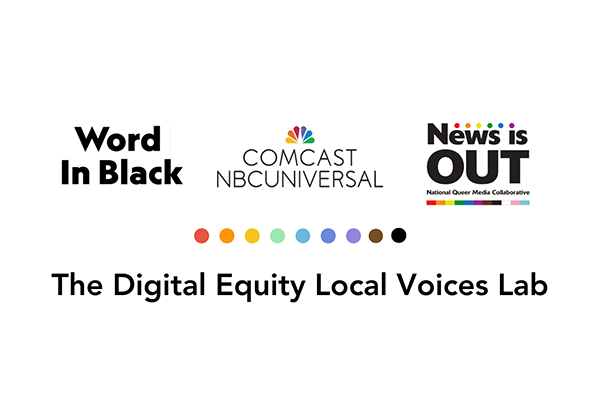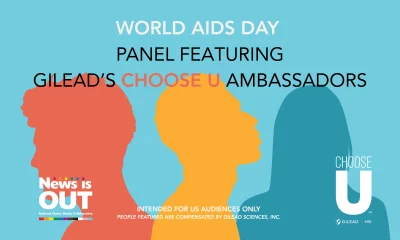News
Comcast NBCUniversal Partners with News is Out and Word In Black to Launch Fellowship Program that Highlights Black and LGBTQ+ Issues
Digital Equity Local Voices Lab Fellows to be Placed at 16 Local Publications to Receive Training and Create Content

News is Out, a queer media collaborative of six of the nation’s legendary LGBTQ+ publications, and Word In Black, a collaborative of ten of the nation’s legendary Black publishers, are joining Comcast NBCUniversal for a groundbreaking initiative: The Digital Equity Local Voices Lab. Through Project UP, Comcast’s $1 billion commitment to advance digital equity and economic opportunities, the company is donating more than $1 million to launch this first-of-its-kind Lab that supports coverage of Black and LGBTQ+- topics in the media and supports emerging journalists with a passion for reporting on issues of importance to these communities.
Together, the three organizations will work to shed light on issues within marginalized communities across 16 news publications with the training and resources needed to tell these stories through media and technology and celebrate the work being done by Black and LGBTQ+ leaders in their communities.
“Word In Black is looking forward to working with our colleagues at News is Out and Comcast NBCUniversal on this groundbreaking fellowship program,” said Chris Bennett, publisher of the Seattle Medium and member of the Word In Black collaboration. “Uplifting the voices of journalists and publishers who are dedicated to covering Black and LGBTQ+ stories is vital to the future of inclusive media.”
Specifically, the Lab will elevate Black and LGBTQ+ perspectives through content creation and content sharing with NBCUniversal and NBCU Academy during a year-long fellowship program that places 16 fellows at the 16 participating news organizations.
Fellows will be part of a cohort that receives best practices and learnings from journalists and media professionals at News is Out, Word In Black, and NBCUniversal. They will also report on stories of Black and LGBTQ+ entrepreneurs and creatives in their communities, share training and resources on using technology more in their daily lives, report on policy related to access to technology and connectivity, and share the work being done to advance digital equity.
“As a Black queer woman, I know the impact of empowering and elevating Black and LGBTQ+ voices,” said Eboné F. Bell, publisher of Tagg Magazine. “This project gives us an opportunity to instill a great amount of knowledge and experience in fellows who can help amplify the voice of these communities in the media industry.”
The Local Media Foundation (LMF) will manage the fellowship and Lab and facilitate content creation to reach diverse audiences between the 16 publishers and Comcast NBCUniversal. Word In Black and News is Out are collaboratives that were launched by LMF.
“Comcast is proud to launch this important initiative with the Local Media Foundation, News is Out, and Word In Black to empower a new generation of journalists and media professionals ” said Anzio Williams, SVP of Diversity, Equity, and Inclusion at NBCUniversal Local. “Ensuring that the stories and perspectives of underrepresentedcommunities are featured in the media by dedicated, trained and resourced journalists is at the heart of Project UP’s and NBCU Academy’s mission. We look forward to seeing these journalists grow in their career and influence.”
Applications are open to anyone with a passion for covering communities of color and/or LGBTQ+ issues. To learn more and apply, visit this link.
The 16 participating publications are:
- AFRO News (Baltimore): Founded in 1892,AFRO provides readers with good news about the Black community not otherwise found. The AFRO and its talented team of journalists have won numerous awards, including NNPA newspaper of the year in 2022, and was named the Nation’s # 1 African American Newspaper by Essence-Nielsen Consumer Survey.
- The Atlanta Voice(Atlanta):The Atlanta Voice has been serving the metropolitan Atlanta community for more than 58 years. Birthed out of the Civil Rights movement as a trusted, authentic, fact and community driven media outlet for Black Atlanta. The publication’s motto is “A People Without A Voice Cannot be Heard”.
- Bay Area Reporter (San Francisco): Launched in 1971, this weekly newspaper is one of the oldest and a pioneer in LGBTQ+ media.
- Dallas Voice (Dallas): The premier media source for LGBTQ Texas, publishing every Friday since 1984.
- Dallas Weekly (Dallas): Since 1954, Dallas Weekly has been at the epicenter of all things African American in north Texas, one of the country’s fastest-growing regions.
- Houston Defender (Houston): Since 1930, the Houston Defender Network has been “Raising Black Voices” as we Educate, Entertain and Empower the Greater Houston Black Community.
- Michigan Chronicle (Detroit) The Michigan Chronicle is a news, information, and events company that covers the interests of the African American community. Leaders and readers in metropolitan Detroit look to the Michigan Chronicle to stay informed about issues that impact their lives.
- New York Amsterdam News (New York City): Started more than a century ago, with a $10 investment, New York Amsterdam News has gone on to become one of the most important Black newspapers in the country and today remains one of the most influential Black-owned and -operated media businesses in the nation, if not the world.
- Philadelphia Gay News (Philadelphia): The largest and oldest publication targeting the LGBTQ+ community, started in 1976.
- The Sacramento Observer (Sacramento): Established in 1962, The Sacramento Observer has been one of the most decorated publications in the history of the Black Press.
- Seattle Medium (Seattle): Founded on January 15, 1970, The Seattle Medium is the flagship publication of Tiloben Publishing Co., Inc. – the largest minority-owned and operated communications company in the Pacific Northwest, serving the Seattle, Tacoma and Portland Markets – and is the primary source of news that residents of Seattle read to stay informed regarding issues and events that affect and enhance the quality of life in African American community.
- The St. Louis American (St. Louis):Since 1928, The St. Louis American newspaper remains Black-owned and has emergedas the leading, most trusted voice of the area’s African American community.
- Tagg Magazine (National): This award-winning and Black queer, woman-owned publication, founded in 2012, is committed to uplifting the voices of all LGBTQ+ women across the country. Tagg was created to serve “everything lesbian, queer, and under the rainbow.”
- Washington Blade (Washington, D.C.): This weekly publication is the oldest LGBTQ+ newspaper in the U.S. It was launched in 1969.
- The Washington Informer (Washington, D.C.): Founded the paper in 1964, this weekly, women-owned media company serves as the link to the African American community in the D.C. metropolitan area.
- Windy City Times (Chicago): Founded in 1985, this legacy LGBTQ+ newspaper and website covers Chicago and its suburbs.
Kansas
ACLU sues Kansas over law invalidating trans residents’ IDs
A new Kansas bill requires transgender residents to have their driver’s licenses reflect their sex assigned at birth, invalidating current licenses.

Transgender people across Kansas received letters in the mail on Wednesday demanding the immediate surrender of their driver’s licenses following passage of one of the harshest transgender bathroom bans in the nation. Now the American Civil Liberties Union is filing a lawsuit to block the ban and protect transgender residents from what advocates describe as “sweeping” and “punitive” consequences.
Independent journalist Erin Reed broke the story Wednesday after lawmakers approved House Substitute for Senate Bill 244. In her reporting, Reed included a photo of the letter sent to transgender Kansans, requiring them to obtain a driver’s license that reflects their sex assigned at birth rather than the gender with which they identify.
According to the reporting, transgender Kansans must surrender their driver’s licenses and that their current credentials — regardless of expiration date — will be considered invalid upon the law’s publication. The move effectively nullifies previously issued identification documents, creating immediate uncertainty for those impacted.
House Substitute for Senate Bill 244 also stipulates that any transgender person caught driving without a valid license could face a class B misdemeanor, punishable by up to six months in jail and a $1,000 fine. That potential penalty adds a criminal dimension to what began as an administrative action. It also compounds the legal risks for transgender Kansans, as the state already requires county jails to house inmates according to sex assigned at birth — a policy that advocates say can place transgender detainees at heightened risk.
Beyond identification issues, SB 244 not only bans transgender people from using restrooms that match their gender identity in government buildings — including libraries, courthouses, state parks, hospitals, and interstate rest stops — with the possibility for criminal penalties, but also allows for what critics have described as a “bathroom bounty hunter” provision. The measure permits anyone who encounters a transgender person in a restroom — including potentially in private businesses — to sue them for large sums of money, dramatically expanding the scope of enforcement beyond government authorities.
The lawsuit challenging SB 244 was filed today in the District Court of Douglas County on behalf of anonymous plaintiffs Daniel Doe and Matthew Moe by the American Civil Liberties Union, the ACLU of Kansas, and Ballard Spahr LLP. The complaint argues that SB 244 violates the Kansas Constitution’s protections for personal autonomy, privacy, equality under the law, due process, and freedom of speech.
Additionally, the American Civil Liberties Union filed a temporary restraining order on behalf of the anonymous plaintiffs, arguing that the order — followed by a temporary injunction — is necessary to prevent the “irreparable harm” that would result from SB 244.
State Rep. Abi Boatman, a Wichita Democrat and the only transgender member of the Kansas Legislature, told the Kansas City Star on Wednesday that “persecution is the point.”
“This legislation is a direct attack on the dignity and humanity of transgender Kansans,” said Monica Bennett, legal director of the ACLU of Kansas. “It undermines our state’s strong constitutional protections against government overreach and persecution.”
“SB 244 is a cruel and craven threat to public safety all in the name of fostering fear, division, and paranoia,” said Harper Seldin, senior staff attorney for the ACLU’s LGBTQ & HIV Rights Project. “The invalidation of state-issued IDs threatens to out transgender people against their will every time they apply for a job, rent an apartment, or interact with police. Taken as a whole, SB 244 is a transparent attempt to deny transgender people autonomy over their own identities and push them out of public life altogether.”
“SB 244 presents a state-sanctioned attack on transgender people aimed at silencing, dehumanizing, and alienating Kansans whose gender identity does not conform to the state legislature’s preferences,” said Heather St. Clair, a Ballard Spahr litigator working on the case. “Ballard Spahr is committed to standing with the ACLU and the plaintiffs in fighting on behalf of transgender Kansans for a remedy against the injustices presented by SB 244, and is dedicated to protecting the constitutional rights jeopardized by this new law.”
National
After layoffs at Advocate, parent company acquires ‘Them’ from Conde Nast
Top editorial staff let go last week

Former staff members at the Advocate and Out magazines revealed that parent company Equalpride laid off a number of employees late last week.
Those let go included Advocate editor-in-chief Alex Cooper, Pride.com editor-in-chief Rachel Shatto, brand partnerships manager Erin Manley, community editor Marie-Adélina de la Ferriére, and Out magazine staff writers Moises Mendez and Bernardo Sim, according to a report in Hollywood Reporter.
Cooper, who joined the company in 2021, posted to social media that, “Few people have had the privilege of leading this legendary LGBTQ+ news outlet, and I’m deeply honored to have been one of them. To my team: thank you for the last four years. You’ve been the best. For those also affected today, please let me know how I can support you.”
The Advocate’s PR firm when reached by the Blade said it no longer represents the company. Emails to the Advocate went unanswered.
Equalpride on Friday announced it acquired “Them,” a digital LGBTQ outlet founded in 2017 by Conde Nast.
“Equalpride exists to elevate, celebrate and protect LGBTQ+ storytelling at scale,” Equalpride CEO Mark Berryhill said according to Hollywood Reporter. “By combining the strengths of our brands with this respected digital platform, we’re creating a unified ecosystem that delivers even more impact for our audiences, advertisers, and community partners.”
It’s not clear if “Them” staff would take over editorial responsibilities for the Advocate and Out.

In an official statement released at the reveal event Capital Pride Alliance described its just announced 2026 Pride theme of “Exist, Resist, Have the Audacity” as a “bold declaration affirming the presence, resilience, and courage of LGBTQ+ people around the world.”
The statement adds, “Grounded in the undeniable truth that our existence is not up for debate, this year’s theme calls on the community to live loudly and proudly, stand firm against injustice and erasure, and embody the collective strength that has always defined the LGBTQ+ community.”
In a reference to the impact of the hostile political climate, the statement says, “In a time when LGBTQ+ rights and history continue to face challenges, especially in our Nation’s Capital, where policy and public discourse shape the future of our country, together, we must ensure that our voices are visible, heard, and unapologetically centered.”
The statement also quotes Capital Pride Alliance CEO and President Ryan Bos’s message at the Reveal event: “This year’s theme is both a declaration and a demand,” Bos said. “Exist, Resist, Have Audacity! reflects the resilience of our community and our responsibility to protect the progress we’ve made. As we look toward our nation’s 250th anniversary, we affirm that LGBTQ+ people have always been and always will be part of the United States’s history, and we will continue shaping its future with strength and resolve,” he concluded.



















